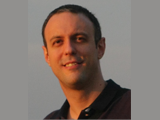IMDEA Networks

IMDEA Networks appoints Dr. Paolo Casari as Research Assistant Professor
23 September 2014

IMDEA Networks has announced that Dr. Paolo Casari will join the Institute in January 2015 in the role of Research Assistant Professor. He is a bright researcher with several years of experience, particularly focused on underwater communications and networking.
Paolo Casari has a proven capacity to engineer team work and successfully launch research initiatives, what makes him a valuable asset to the research team at IMDEA Networks. His telecommunications background has enabled him to transfer his skills to networking research, by developing protocols and algorithms which are aware of (if not directly interacting with) the characteristics of physical communication systems. This improves the realism of his assumptions and contributes to found his work on solid scientific basis. In the same vein, Casari has worked for many years in the scientific community studying underwater acoustic communications. This group values experimentally proven results much more than, e.g., computer simulations, mainly as a consequence of the limited availability of precise information and models about the behavior of the underwater channel. As a consequence, Casari has come to assign particular importance to experimentation and has developed a way of thinking based on real-world requirements and assumptions.
Dr. Casari’s research interests currently lie in the broad areas of protocol design for wireless networks (especially for medium access control, error control and multihop routing), network performance analysis and optimization, simulations and field experimentation. His activity at IMDEA Networks will mainly span three areas:
Firstly, he will continue working on underwater communications, relying on his network of contacts in the field to expand the range of collaborators of IMDEA Networks and promote the launch of multi-lateral projects.
Secondly, he will work on millimeter-wave communications, in order to seek whether and how some of the advanced signal processing ideas developed in the underwater world can be ported to the very-high-frequency radio world. This is an area actively being explored by IMDEA Networks, whose SEARCHLIGHT project is intended to develop wireless technologies in high frequency bands, such as the unlicensed 60 GHz band.
Finally, Casari aims to evolve one of his first research interests, and explore the possibilities offered by next-generation packet-radio cellular networks for multimedia content delivery and communications among smart, autonomous objects.
About Paolo Casari
Paolo Casari received his BE and ME degrees with honors from the University of Ferrara, Italy, in 2002 and 2004, respectively. In 2008, he completed the PhD course in Information Engineering at the University of Padova, also in Italy, where he is currently a senior postdoctoral research fellow. He has been actively researching cross-layer design for MIMO ad hoc networks and wireless sensor networks (WSNs) in the past, and was the technical manager of the Italian WISE-WAI project, focused on city-wide wireless sensor networking.
After a stay at the Massachusetts Institute of Technology in 2007, he started working on underwater acoustic networks, which has been his main research interest over the last six years. Casari has been involved in several projects related to underwater communications and networking, funded by different institutions in the EU and in the US. Among these, he was the technical manager of the NAUTILUS project, supported by the Italian Institute of Technology within the Project SEED framework.
Casari has been part of the TPC or the organizing committee of several international symposia, and consistently serves as a reviewer for major conferences and journals in the field of underwater communications and wireless networking in general. This service has earned him several best-reviewer awards. Furthermore, he has been co-guest editor for the Hindawi Journal of Electronics and Computer Engineering Special Issue on Underwater Communications and Networking. Dr. Casari is a senior member of the IEEE, a member of the ACM and a member of the Italian National Consortium for Telecommunications (CNIT).


Recent Comments